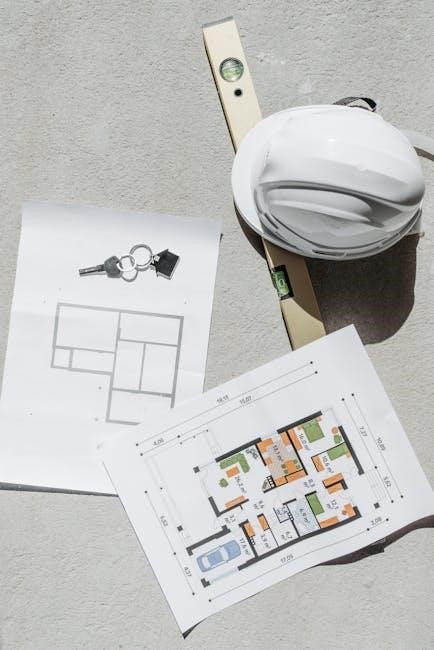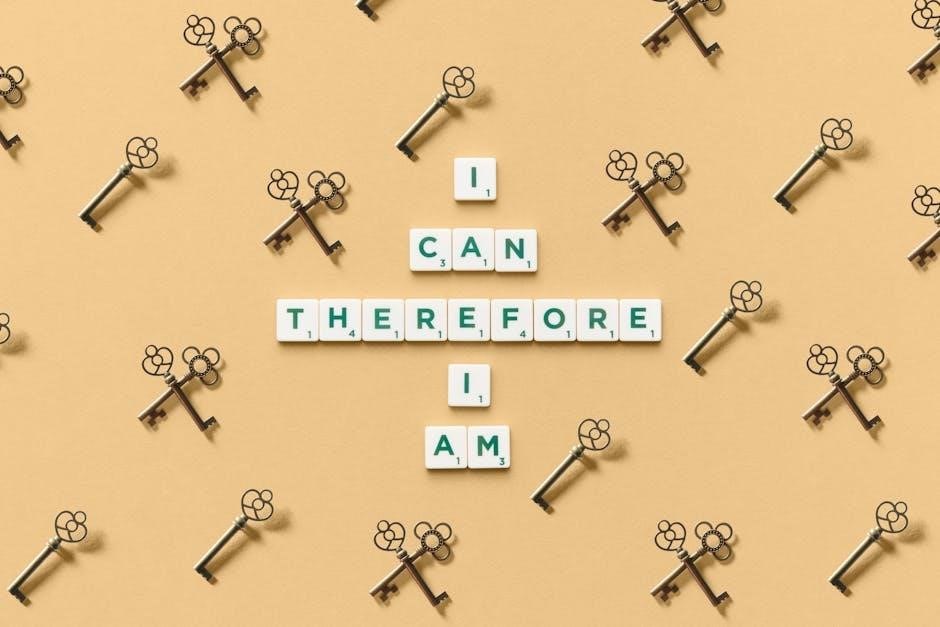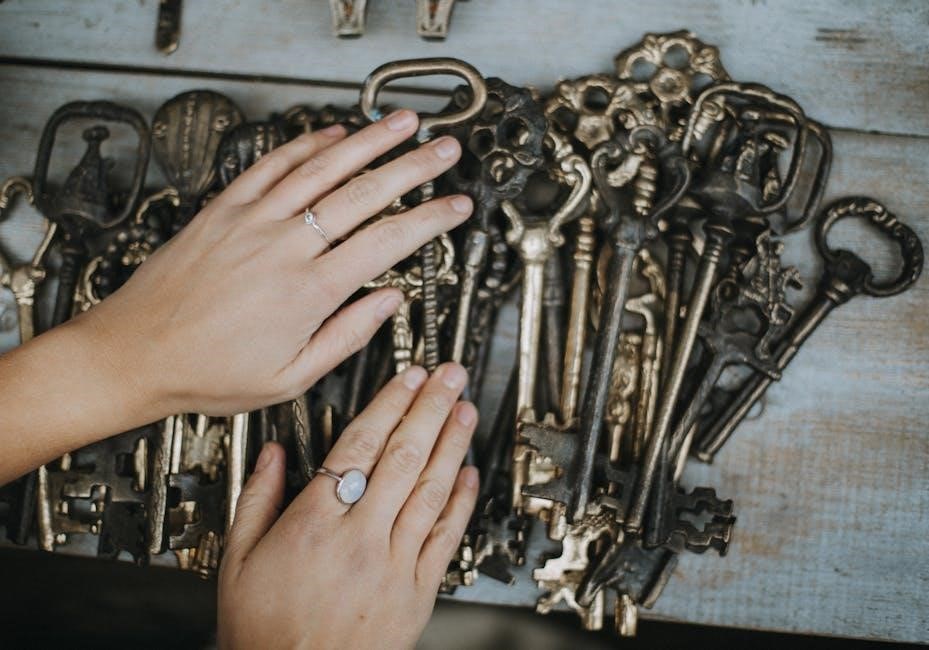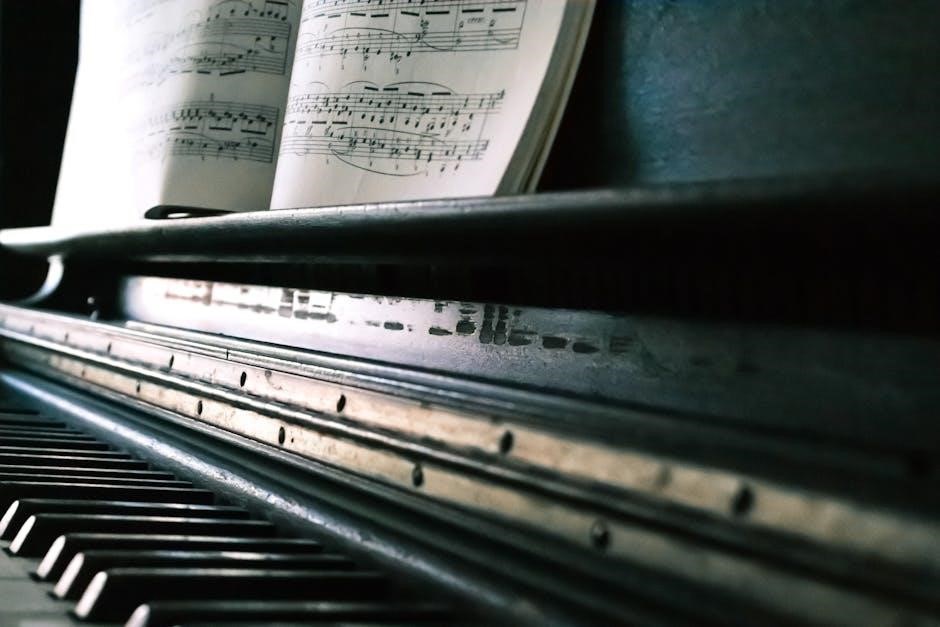Discover the fascinating connection between pianists and their keys in this crossword clue. Explore solving techniques and historical insights to enhance your puzzle-solving skills and cognitive sharpness.

Understanding the Crossword Clue
The “Guides with keys” crossword clue hints at instruments like pianos or keyboards, often linking to pianists or musical terms. It tests your knowledge of music and wordplay.
2.1. Breaking Down the Clue
The clue “Guides with keys” likely refers to instruments like pianos or keyboards, where keys are essential. It may involve wordplay, such as puns or anagrams, to lead to the answer. Common patterns include referencing musicians, like pianists, or terms related to music theory. Solvers should consider synonyms for “guides,” such as “leads” or “directs,” and how they connect to “keys,” possibly hinting at instruments or musical elements. Context is key to narrowing down the answer.
2.2. Common Patterns in Crossword Puzzles
Common patterns in crossword puzzles often involve wordplay, such as puns, anagrams, or double meanings. For the clue “Guides with keys,” a typical approach might be to think of “keys” as part of a piano, leading to the answer “pianist.” Another pattern is the use of homonyms, where a word like “keys” could refer to both musical keys and other types of keys. Additionally, crosswords frequently use synonyms or related terms, such as “guides” meaning “leads” or “directs,” which might connect to “keys” in a metaphorical sense. Understanding these patterns helps solvers decipher clues more effectively, as they often require thinking creatively and making unexpected connections between words.
Historical Context of Piano Keys
Piano keys evolved from harpsichord mechanisms, with early pianos using natural materials like ivory and ebony. Modern keys often incorporate synthetic materials for durability and consistent sound quality.
3.1. Evolution of Piano Keys
The evolution of piano keys reflects advancements in materials and design. Early pianos used natural materials like ivory and ebony, which provided a smooth touch and rich sound. Over time, manufacturers began incorporating synthetic materials to improve durability and consistency. Modern pianos often feature composite keys, blending tradition with innovation for enhanced performance. This transformation mirrors broader technological progress in musical instruments.
3.2. Key Materials and Their Impact on Sound
The materials used for piano keys significantly influence sound quality; Traditional ivory keys offered a smooth touch and rich tone, while ebony keys provided a crisp, clear sound. However, natural materials like ivory and ebony have drawbacks, such as yellowing and brittleness. Modern pianos often use synthetic materials, which mimic the benefits of natural keys while offering improved durability and consistency. This evolution ensures pianists can enjoy high-quality sound with minimal maintenance over time.

Solving Techniques for Guides with Keys
Mastering crossword clues involves wordplay, anagrams, and clue patterns. Utilize solver tools for hints and study historical piano key materials to enhance your problem-solving skills effectively.
4.1. Wordplay and Anagrams
Wordplay and anagrams are essential tools for solving crossword clues like “guides with keys.” Clues often involve clever twists, such as dual meanings or letter rearrangements. For example, “keys” can refer to piano keys or slang for “guides.” Anagrams, like rearranging letters to form “ivories” from “keys,” can unlock answers. Recognizing these patterns and practicing with anagram solvers can significantly improve your solving skills and speed.
4.2. Using Crossword Solver Tools
Crossword solver tools are invaluable for deciphering clues like “guides with keys.” These online resources analyze clues and provide potential answers by searching extensive databases. Tools like Crossword Solver or Crossword Clue Solver allow users to input known letters or patterns, reducing guesswork. They are particularly useful for ambiguous clues, offering insights into wordplay and anagrams. Regular use of these tools can enhance your problem-solving skills and speed up your puzzle-solving process significantly.
- Examples of tools: Crossword Solver, Crossword Clue Solver.
- Benefits: Time-saving, pattern recognition, and improved strategy development.
Related Crossword Clues
Explore other clues like “What the keys are to a pianist?” or “Singer/pianist Keys,” which link music and wordplay, expanding your crossword-solving horizons with similar challenges.
5.1. Singer/Pianist Keys
Alicia Keys, a renowned singer and pianist, often features in crossword clues, blending music and wordplay. Clues like “Singer/pianist Keys” highlight her dual talent, making them popular in puzzles. These clues expand solvers’ knowledge by referencing musicians and their instruments, adding an educational layer to the fun. They appear in various crosswords, such as USA Today and WSJ, offering both challenge and insight into the world of music and artists.
5.2. What the Keys Are to a Pianist
The keys are essential tools for pianists, enabling them to create music. Crossword clues like “What the keys are to a pianist?” often have answers such as “instrument” or “notes,” highlighting their significance. These clues connect music theory with wordplay, challenging solvers to think creatively about the relationship between musicians and their tools. They provide a fun way to explore the intersection of music and language.
Tips for Crossword Puzzle Enthusiasts
Start with simple clues, use wordplay, and explore anagram possibilities. Regular practice enhances vocabulary and sharpens problem-solving skills, making you a more efficient solver over time.
6.1. Starting with the Basics
Begin by identifying common clue types, such as wordplay or anagrams. Focus on short clues first, as they often provide quick solutions. Use crossword solver tools to assist with difficult answers. Start filling in obvious words to build momentum and gradually tackle harder clues. This systematic approach helps improve problem-solving skills and enhances vocabulary. Regular practice strengthens pattern recognition and logical thinking, essential for mastering crosswords.
6.2. Advanced Strategies for Expert Solvers
Expert solvers use advanced techniques like pattern recognition and word list utilization to tackle complex clues. Mastering crossword terminology and understanding clue structures can significantly improve solving efficiency. Experienced solvers often prioritize clues with unique letter patterns or high-probability answers. Additionally, leveraging crossword databases and solver tools can help crack even the toughest puzzles, ensuring a smoother and more enjoyable solving experience.

Case Study: Famous Pianists and Their Keys
Explore the connection between renowned pianists like Alicia Keys, Liberace, and Horowitz, whose names often appear in crossword clues related to musical keys and instruments;
7.1. Alicia Keys: Singer and Pianist
Alicia Keys is a multi-platinum singer-songwriter and pianist, known for her soulful voice and mastery of the piano. Her name often appears in crossword clues, referencing both her music and the piano keys. With hits like “Fallin” and “No One”, she has become a cultural icon, blending R&B with classical influences. Crossword constructors frequently use her name as a clue, highlighting her dual role as a musician and artist, making her a popular figure in both music and puzzle enthusiasts’ circles.
7.2. Legendary Pianists and Their Contributions
Legendary pianists like Horowitz, Liberace, and Paderewski left an indelible mark on music history. Their mastery of the piano keys inspired generations, with their names often appearing in crossword clues. Horowitz’s technical brilliance and Liberace’s flamboyant style made them iconic. Paderewski’s compositions and performances elevated the piano’s role in classical music. These pianists’ contributions continue to influence both music and crossword puzzle themes, making their legacies timeless and their names familiar in both art and entertainment circles.
Common Mistakes in Solving Crossword Clues
Overcomplicating clues and misinterpreting meanings are common errors. Solvers often overlook simple answers, assuming complexity. Staying focused and avoiding overthinking helps in solving clues efficiently and effectively.
8.1. Misinterpreting Clue Meanings
One common mistake is misinterpreting the meaning of crossword clues, leading to incorrect answers. For instance, clues like “What the keys are to a pianist?” might be misunderstood, with solvers thinking of literal keys rather than musical notes. Additionally, overlooking wordplay or anagrams can hinder progress. To avoid this, solvers should carefully analyze each clue, considering both literal and figurative interpretations, and utilize crossword solver tools for assistance when stuck.
8.2. Overcomplicating Simple Answers
Overcomplicating simple answers is a common pitfall in crossword puzzles. Solvers often overthink clues, such as “Guides with keys,” believing the answer is more intricate than it is. For instance, instead of recognizing the simple connection to “piano,” some might explore unrelated concepts. This tendency wastes time and leads to frustration. It’s essential to trust the straightforward nature of some clues and verify answers with reliable sources or tools to avoid unnecessary confusion.
The Role of Keys in Music Instruments
Keys are essential components in many instruments, primarily the piano, guiding sound creation and melody formation through precise presses, reflecting both tradition and technological evolution in music.
9.1. Beyond the Piano: Other Key-Based Instruments
Beyond the piano, keys play a crucial role in organs, synthesizers, and harpsichords. Organs use keys to control pipes, creating rich, resonant sounds. Synthesizers generate electronic tones, offering versatility in modern music. Harpsichords, historically significant, use keys to pluck strings. Each instrument leverages keys uniquely, but all share the common purpose of creating melody and harmony, expanding the musical landscape beyond the piano’s traditional realm.
9.2. Technological Advancements in Key Design
Modern technology has revolutionized key design, introducing weighted actions, touch-sensitive surfaces, and digital interfaces. These innovations allow for dynamic expression and precise control. MIDI keyboards and digital pianos offer connectivity and versatility, while materials like carbon fiber enhance durability. Such advancements ensure that keys remain central to music-making, blending tradition with cutting-edge innovation for diverse musical applications and preferences across genres and performance settings.
Crossword Puzzle Benefits for Cognitive Health
Crossword puzzles enhance memory, focus, and vocabulary while building knowledge and mental agility. They provide a mental workout that sharpens cognitive skills and boosts brain health effectively.
10.1. Enhancing Memory and Focus
Crossword puzzles are a powerful tool for enhancing memory and focus. By engaging the brain in active problem-solving, they strengthen neural connections and improve cognitive function. Regularly solving crosswords can boost concentration, enhance mental clarity, and even slow cognitive decline. The process of recalling words and patterns sharpens memory retention, making it easier to stay mentally agile and focused in daily life. This mental workout fosters sharper thinking and better overall brain health.
10.2. Building Vocabulary and Knowledge
Crossword puzzles are an excellent way to expand your vocabulary and broaden your knowledge. By encountering new words and their meanings, you enhance your linguistic skills. Regular solving exposes you to diverse topics, fostering a deeper understanding of various subjects. This mental exercise not only enriches your vocabulary but also strengthens your ability to connect ideas and think critically, making it a valuable tool for lifelong learning and intellectual growth.

Guides with Keys: A Thematic Approach
Guides with keys often symbolize leadership and direction, much like a pianist guiding music through piano keys, revealing a harmonious blend of skill and artistry.
11.1. Themed Crossword Puzzles
Themed crossword puzzles offer engaging challenges, often centering on specific motifs like music or leadership. “Guides with keys” can represent pianists or directional tools, adding a creative twist. These puzzles attract enthusiasts by incorporating relatable themes, making them both entertaining and intellectually stimulating. They often feature clever wordplay and connections, enhancing the solver’s experience and fostering a deeper appreciation for thematic design in crosswords.
11.2. Creating Your Own Themed Puzzle
Designing a themed crossword puzzle involves selecting a central idea, like music or leadership, and gathering related vocabulary. For “guides with keys,” focus on terms like pianists, instruments, or navigation tools. Organize words into a grid, ensuring a mix of easy and challenging clues. Balance fun and complexity to engage solvers, making it both entertaining and intellectually stimulating. Test your puzzle to refine it, ensuring clarity and enjoyable solving experience.

Advanced Strategies for Solving Crossword Clues
Mastering crossword patterns and anagram recognition can significantly enhance solving skills. Utilize specialized tools and databases for wordplay insights, ensuring a deeper understanding of clue structures and terminology.
12.1. Utilizing Word Lists and Databases
Leverage comprehensive word lists and crossword databases to identify patterns and common answers. These resources often categorize words by length and theme, aiding solvers in quickly narrowing down potential solutions. For clues like “guides with keys,” databases can reveal frequent associations, such as “piano keys” or “Alicia Keys,” streamlining the solving process and enhancing efficiency significantly.
12.2. Mastering Crossword Puzzle Terminology
Understanding crossword terminology is key to solving clues effectively. Terms like “anagram,” “wordplay,” and “abbreviation” often hint at the type of answer required. For example, “guides with keys” might involve an anagram or a play on words like “piano keys.” Familiarizing yourself with these terms and their meanings can significantly improve your solving speed and accuracy, especially in complex puzzles.
The Evolution of Crossword Puzzles
From print to digital, crossword puzzles have evolved, offering solver tools and online platforms that enhance accessibility and simplify solving, making them a timeless brain teaser.
13.1. From Print to Digital Platforms
The transition from print to digital has revolutionized crossword puzzles, offering solvers unprecedented convenience and interactivity. Online platforms now provide instant access, real-time updates, and interactive tools, enhancing the solving experience. Digital crosswords also enable features like auto-fill, hints, and error checking, making puzzles more accessible and engaging for both casual and expert solvers. This shift has ensured the timeless appeal of crosswords in the modern era.
13.2. Impact of Technology on Puzzle Solving
Technology has transformed how crosswords are solved, offering tools like crossword solvers, databases, and apps that assist in finding answers quickly. These resources provide instant access to solutions, reducing frustration and enabling solvers to focus on strategy. Additionally, online communities and forums foster collaboration, allowing enthusiasts to share insights and learn from one another. Technology has thus enhanced both efficiency and enjoyment in solving crossword puzzles, making them more accessible than ever before.

Glossary of Crossword Puzzle Terms
Explore essential terms like anagrams, clues, grids, and themes, crucial for understanding crossword puzzles. These terms help solvers navigate challenges and improve their problem-solving skills effectively online.
14.1. Key Terms Every Solver Should Know
Understanding crossword terminology is vital for success. Terms like anagram, clue types (e.g., definitions, puns), grid patterns (symmetrical or themed), and abbreviations (like “et al.”) are essential. Familiarize yourself with crossword lingo to decode puzzles efficiently and enhance your solving experience. These terms are your guide to mastering both simple and complex clues, ensuring you never miss a beat in your crossword journey.
14.2. Understanding Abbreviations and Shortforms
Abbreviations and shortforms are common in crosswords to save space. Examples include et al. (and others), Mt. (Mount), and St. (Saint or Street). Recognizing these is crucial for solving clues. Often, they appear as hints for longer answers. For instance, keys might relate to ALICIA (Alicia Keys) or PIANO. Mastering these shortcuts enhances your solving speed and accuracy, making you a more efficient crossword enthusiast. Always keep a mental list of common abbreviations to decode clues effectively.
Guides with keys crossword clues offer a blend of fun and cognitive challenge, enhancing memory, focus, and vocabulary. Embrace the journey, and keep sharpening your puzzle-solving skills!
15.1. Final Thoughts on Guides with Keys
The “guides with keys” crossword clue elegantly blends music and wordplay, challenging solvers to connect pianists with their instruments. This clue highlights the cognitive benefits of crosswords, such as enhanced memory and vocabulary. By exploring historical and thematic angles, solvers gain deeper insights into the world of music and puzzles. Embrace the journey, as each clue solved is a step toward sharper mental agility and a lifelong love for problem-solving.
15.2. Encouragement for Continued Puzzle Solving
Embrace the joy of crossword puzzles as a rewarding mental exercise. Each solved clue, like “guides with keys,” sharpens memory, expands vocabulary, and boosts cognitive agility.Persist in your puzzle-solving journey, celebrating small victories and staying curious. The satisfaction of uncovering hidden meanings and connections makes every challenge worthwhile, fostering a lifelong passion for learning and intellectual growth.

